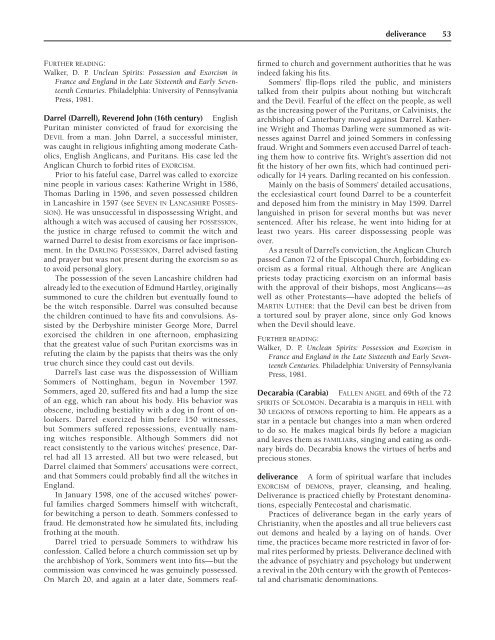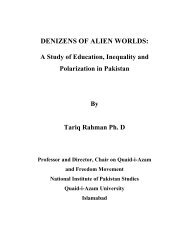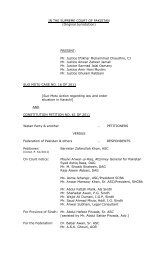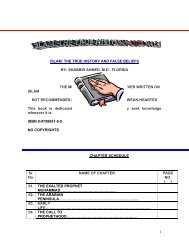The Encyclopedia Of Demons And Demonology
The Encyclopedia Of Demons And Demonology
The Encyclopedia Of Demons And Demonology
You also want an ePaper? Increase the reach of your titles
YUMPU automatically turns print PDFs into web optimized ePapers that Google loves.
deliverance 53<br />
FURTHER READING:<br />
Walker, D. P. Unclean Spirits: Possession and Exorcism in<br />
France and England in the Late Sixteenth and Early Seventeenth<br />
Centuries. Philadelphia: University of Pennsylvania<br />
Press, 1981.<br />
Darrel (Darrell), Reverend John (16th century) English<br />
Puritan minister convicted of fraud for exorcising the<br />
DEVIL from a man. John Darrel, a successful minister,<br />
was caught in religious infighting among moderate Catholics,<br />
English Anglicans, and Puritans. His case led the<br />
Anglican Church to forbid rites of EXORCISM.<br />
Prior to his fateful case, Darrel was called to exorcize<br />
nine people in various cases: Katherine Wright in 1586,<br />
Thomas Darling in 1596, and seven possessed children<br />
in Lancashire in 1597 (see SEVEN IN LANCASHIRE POSSES-<br />
SION). He was unsuccessful in dispossessing Wright, and<br />
although a witch was accused of causing her POSSESSION,<br />
the justice in charge refused to commit the witch and<br />
warned Darrel to desist from exorcisms or face imprisonment.<br />
In the DARLING POSSESSION, Darrel advised fasting<br />
and prayer but was not present during the exorcism so as<br />
to avoid personal glory.<br />
<strong>The</strong> possession of the seven Lancashire children had<br />
already led to the execution of Edmund Hartley, originally<br />
summoned to cure the children but eventually found to<br />
be the witch responsible. Darrel was consulted because<br />
the children continued to have fits and convulsions. Assisted<br />
by the Derbyshire minister George More, Darrel<br />
exorcised the children in one afternoon, emphasizing<br />
that the greatest value of such Puritan exorcisms was in<br />
refuting the claim by the papists that theirs was the only<br />
true church since they could cast out devils.<br />
Darrel’s last case was the dispossession of William<br />
Sommers of Nottingham, begun in November 1597.<br />
Sommers, aged 20, suffered fits and had a lump the size<br />
of an egg, which ran about his body. His behavior was<br />
obscene, including bestiality with a dog in front of onlookers.<br />
Darrel exorcized him before 150 witnesses,<br />
but Sommers suffered repossessions, eventually naming<br />
witches responsible. Although Sommers did not<br />
react consistently to the various witches’ presence, Darrel<br />
had all 13 arrested. All but two were released, but<br />
Darrel claimed that Sommers’ accusations were correct,<br />
and that Sommers could probably find all the witches in<br />
England.<br />
In January 1598, one of the accused witches’ powerful<br />
families charged Sommers himself with witchcraft,<br />
for bewitching a person to death. Sommers confessed to<br />
fraud. He demonstrated how he simulated fits, including<br />
frothing at the mouth.<br />
Darrel tried to persuade Sommers to withdraw his<br />
confession. Called before a church commission set up by<br />
the archbishop of York, Sommers went into fits—but the<br />
commission was convinced he was genuinely possessed.<br />
On March 20, and again at a later date, Sommers reaffirmed<br />
to church and government authorities that he was<br />
indeed faking his fits.<br />
Sommers’ flip-flops riled the public, and ministers<br />
talked from their pulpits about nothing but witchcraft<br />
and the Devil. Fearful of the effect on the people, as well<br />
as the increasing power of the Puritans, or Calvinists, the<br />
archbishop of Canterbury moved against Darrel. Katherine<br />
Wright and Thomas Darling were summoned as witnesses<br />
against Darrel and joined Sommers in confessing<br />
fraud. Wright and Sommers even accused Darrel of teaching<br />
them how to contrive fits. Wright’s assertion did not<br />
fit the history of her own fits, which had continued periodically<br />
for 14 years. Darling recanted on his confession.<br />
Mainly on the basis of Sommers’ detailed accusations,<br />
the ecclesiastical court found Darrel to be a counterfeit<br />
and deposed him from the ministry in May 1599. Darrel<br />
languished in prison for several months but was never<br />
sentenced. After his release, he went into hiding for at<br />
least two years. His career dispossessing people was<br />
over.<br />
As a result of Darrel’s conviction, the Anglican Church<br />
passed Canon 72 of the Episcopal Church, forbidding exorcism<br />
as a formal ritual. Although there are Anglican<br />
priests today practicing exorcism on an informal basis<br />
with the approval of their bishops, most Anglicans—as<br />
well as other Protestants—have adopted the beliefs of<br />
MARTIN LUTHER: that the Devil can best be driven from<br />
a tortured soul by prayer alone, since only God knows<br />
when the Devil should leave.<br />
FURTHER READING:<br />
Walker, D. P. Unclean Spirits: Possession and Exorcism in<br />
France and England in the Late Sixteenth and Early Seventeenth<br />
Centuries. Philadelphia: University of Pennsylvania<br />
Press, 1981.<br />
Decarabia (Carabia) FALLEN ANGEL and 69th of the 72<br />
SPIRITS OF SOLOMON. Decarabia is a marquis in HELL with<br />
30 LEGIONs of DEMONs reporting to him. He appears as a<br />
star in a pentacle but changes into a man when ordered<br />
to do so. He makes magical birds fly before a magician<br />
and leaves them as FAMILIARs, singing and eating as ordinary<br />
birds do. Decarabia knows the virtues of herbs and<br />
precious stones.<br />
deliverance A form of spiritual warfare that includes<br />
EXORCISM of DEMONs, prayer, cleansing, and healing.<br />
Deliverance is practiced chiefly by Protestant denominations,<br />
especially Pentecostal and charismatic.<br />
Practices of deliverance began in the early years of<br />
Christianity, when the apostles and all true believers cast<br />
out demons and healed by a laying on of hands. Over<br />
time, the practices became more restricted in favor of formal<br />
rites performed by priests. Deliverance declined with<br />
the advance of psychiatry and psychology but underwent<br />
a revival in the 20th century with the growth of Pentecostal<br />
and charismatic denominations.












